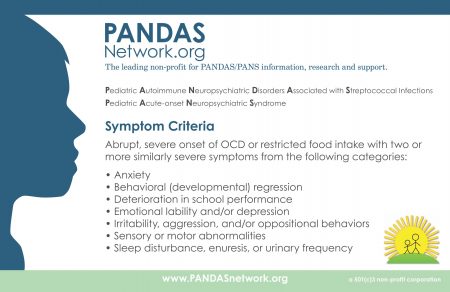IVIG Produces Long-Term Results in PANDAS
PANDAS, or pediatric autoimmune neuropsychiatric disorder associated with streptococcal infection, is an autoimmune condition that produces psychiatric symptoms that appear suddenly following a case of strep throat in children. These symptoms can include obsessive-compulsive symptoms, tics, and behavioral dyscontrol and regression. Treatments are still experimental, but those that target the immune system are expected to be most successful at improving PANDAS.
In 2015, Miro Kovacevic and colleagues published a case series describing the use of intravenous immunoglobulin treatment (IVIG) in twelve children with PANDAS in the Journal of Child and Adolescent Psychopharmacology. One or in some cases two injections of IVIG brought about long-term remission in the children with PANDAS.
IVIG consists of a wide range of antibodies from multiple individuals delivered via injection. This increase in the quality or quantity of antibodies in the recipient is thought to suppress the production of antibodies that attack brain cells, causing PANDAS. The case series was based on patients at a large clinical practice that specializes in the treatment of PANDAS. The practice used a dosage of 1.5g/kg divided into two daily doses of 750 mg/kg, meant to match twice the volume of the patients’ own immunoglobulin G.
IVIG and other anti-inflammatory approaches are also effective in PANS, a more general variation on PANDAS in which psychiatric symptoms occur following an infection other than strep.
Immune Therapy with IVIG May Help Children with PANDAS
 A small number of children exposed to streptococcal bacteria have an autoimmune response that manifests in sudden, severe obsessive-compulsive behaviors and tics. This disorder is known as PANDAS: pediatric autoimmune neuropsychiatric disorder associated with streptococcal infection, and it resembles the broader disorder PANS, which can occur after other types of bacterial or viral infections.
A small number of children exposed to streptococcal bacteria have an autoimmune response that manifests in sudden, severe obsessive-compulsive behaviors and tics. This disorder is known as PANDAS: pediatric autoimmune neuropsychiatric disorder associated with streptococcal infection, and it resembles the broader disorder PANS, which can occur after other types of bacterial or viral infections.
Research on treatments for PANDAS and PANS is scant, but therapies that target the immune system seem to have more success than typical psychiatric treatments. In a 2015 article in the Journal of Child and Adolescent Psychiatry, researcher Miro Kovacevic and colleagues described a case series of 12 youths with PANDAS who were treated with intravenous immunoglobin (IVIG), a treatment designed to regulate the immune system. (The participants also met diagnostic criteria for PANS.)
The authors suggest that PANDAS symptoms result from a misdirected immune response that attacks the patient’s brain instead of or in addition to attacking the initial infection. IVIG treatment uses a mixture of antibodies from about 1,000 people. When this mixture is infused into the patient’s blood, the antibodies help deflect the autoimmune attack on the patient’s body. All of the 12 patients had a good long-term response to IVIG. Some did well after just one infusion, while two needed a second infusion because they did not respond to the first, and five had recurring symptoms that required a second infusion. All of the patients had previously received two other types of treatment: a 5-day course of steroids and antibiotics, neither of which produced immediate improvements.
The authors concluded that effective long-term treatment of PANS or PANDAS should combine immune therapy, prevention of future infections with antibiotics, and treatment that targets their psychiatric symptoms, such as anti-obsessional medication or cognitive-behavioral therapy.
Immune Therapy Studied in Alzheimer’s Disease Fails
Following some research that inflammatory changes occur in patients with Alzheimer’s disease, immunotherapy with intravenous immunoglobin (IVIG), a treatment typically used to treat autoimmune diseases and neurological problems, was investigated in Alzheimer’s. The treatment consists of a mix of antibodies derived from the blood plasma of thousands of young, healthy blood donors, which are then delivered in a slow intravenous infusion. IVIG not only includes antibodies to particular proteins implicated in Alzheimer’s disease, but it also has general anti-inflammatory effects.
A particular dosage of IVIG (0.4g/kg every two weeks) seemed to completely stop progression of Alzheimer’s in the four patients who received it consistently for three years as part of a small open study. (Twenty other patients received other doses of IVIG or received placebo for part of the time, and the cognitive functioning of these patients deteriorated.) However, a large, double-blind, randomized study of IVIG did not show that the treatment had greater efficacy than placebo.



